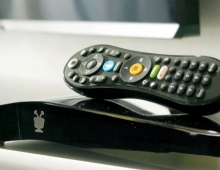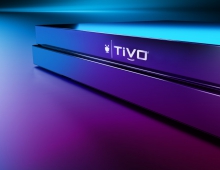
TiVo looks for an edge
Kyle Copeland has more than 90GB worth of digital music stored on various networked computers and Apple Computer iPods. The problem was finding a convenient way to play it.
Airport Express devices plugged into various power outlets throughout his home allowed him to wirelessly play selections from his vast music collection on stereos and speakers in different rooms.
But every time the 29-year-old Marlboro, Mass., engineer wanted to change a song playing from his iTunes library over his wireless network, he had to walk over to his computer. Sitting in front of his television one day, Copeland had a realization: "That's when I thought, 'Most places where there are speakers there's a television."
So Copeland and fellow engineer John Brosnan created iSeeiTunes, a program that lets users control the songs played over a network via their TV.
With more than 5,000 users since its March launch, iSeeiTunes has become a relative hit among the TiVo developer community, garnering high ratings in forums dedicated to TiVo applications. The program's popularity speaks both to its usefulness and the creative potential of developers, which TiVo hopes to harness as it attempts to transform its service into more than for just digital video recording.
Copeland and Brosnan, in fact, are entering their creation in TiVo's HME (Home Media Engine) Developer Challenge, a contest that calls on Java developers to create applications for broadband-connected TiVo recorders. Home Media Engine is the code name for TiVo's strategy to boost development of its DVR service to include broader capabilities.
Expanding its offering is mandatory for TiVo, and that's not lost on company executives. Many critics have said that TiVo's service, while innovative and backed by loyal fans and customers, is simply one feature that can't support an entire company. This analysis has seemingly been backed up by the number of copycat DVR services being made available by cable and satellite service operators. Software giant Microsoft even added a DVR feature to a version of its Windows XP operating system, Media Center Edition.
Digital video recorders are similar to VCRs, allowing consumers to record TV shows, but instead of storing to tape, DVRs use a hard drive. In addition, the digital devices can pause, fast-forward or rewind through shows and be programmed to record shows weeks ahead of time.
The Linux-based software behind the TiVo service has always been fertile ground for hackers, and while the company frowned on those efforts initially, it did little to stop them. However, TiVo is now encouraging developers to tinker in hopes of finding new features to add to its iconic DVR service and expand TiVo into an interface to control home networks.
"One of the things (HME) brings to the community is the ability to extend TiVo without it being considered "hacking"--it's legitimate now," said Amir Gharaat, the project manager for HME at TiVo. "Now they're developing applications and extending the functionality, and in the future, we'll do even more, as we add capabilities to the platform."
Hacking: It's a good thing TiVo's HME Developer Challenge is part of that effort. Consumers with broadband-connected TiVo recorders are still a small number--about 300,000--and so far only about 60 applications are available on the Internet. The deadline for contest submissions is May 1, and the winners will be announced at the JavaOne conference in late June.
"There's a lot of interest around hacking TiVo boxes...this was a way to help people see TiVo as a platform," said Arthur van Hoff, former principal engineer at TiVo responsible for the HME project. Van Hoff has even created a program allowing him to control his home-lighting system from his TiVo.
Software and applications in development for HME aren't widely available yet but will be sometime after the contest, Gharaat said. TiVo often staggers the release of new software in an effort to debug the programs before releasing them to its entire audience. The new programs will initially only be available to owners of standalone Series2 DVR models.
Copeland's setup has the iSeeiTunes application loaded onto his Apple PowerBook notebook, which, along with his Series2 DVR, is connected to his wireless network. On his DVR, iSeeiTunes shows up as a menu listing that allows him to tell the notebook which songs to play. The notebook then transmits the songs to Airport Express devices connected to stereos, which play the songs--a complex but handy way of playing digital music in his home.
The music-playing application, which took about a month and a half to write, was in part made possible by a software development kit made available by TiVo to programmers earlier this year as part of its Java contest.
eBay auctions via DVR
Developers have been busy. One program called Java TivoDemo allows TiVo subscribers to bid and search for books, DVDs, music and video games on eBay through their DVRs. Another, developed by van Hoff, is GoogleMap, which allows viewers to see map and satellite information on their televisions. Galleon is an open-source project aimed at organizing content on a PC so it can be viewed on a TV. Another displays pictures from photo-sharing site Flickr.
Many of the current applications are proof of concept, meaning they're meant to demonstrate what's possible--although not necessarily practical--through TiVo DVRs.
However, Gharaat says the programs will be as rich and as useful as the developers want to make them. "As an open platform, a significant portion of the applications will be deployed and supported by third parties."
That means TiVo will have to be more active in helping developers--and so far it has been.
"I've been surprised by how open they made (HME), to the point where some programs could be developed that are in competition with what they are doing with Tahiti," said Leon Nicholls, leader of the Galleon project. Tahiti aims to make Internet content available on the television through the TiVo service.
Copeland says he plans to take up the opportunity and improve iSeeiTunes to include a fuller interface so it's easier to go through a music collection. He is mulling the idea of selling future versions of the software and starting a business.
Will new features be enough?
While creating new applications for TiVo may be a no-brainer, getting them into the boxes of their distribution partners--cable and satellite--may not be. For example, TiVo's biggest partner, DirecTV, has not made features beyond the DVR available to its satellite subscribers.
The satellite company has said there wasn't enough demand for the new features to justify the cost of customer support calls. If partners continue to choose not to make new features available, it could hurt TiVo's efforts to set itself apart from generic DVR services.
This has led some investors to believe that in order to survive, the company would have to sell itself--names of potential suitors have most recently included Google and Yahoo, but also Apple, Sony and Comcast have also been rumored about.
TiVo executives declined to comment on acquisition talks.
Company representatives have said the company never planned to stop with the DVR service. Instead they aim to build off the rising number of TiVo subscribers in the market--currently more than 3 million and counting--by offering new features that complement the DVR. Earlier this year, TiVo announced its Tahiti strategy, of which HME is a part.
Such ambitions have been discussed and attempted before, but without a success story to emulate, many wonder if the convergence of the Internet and television is a mine worth continuing to dig.
"People don't want to watch the Internet on the TV," said Jon Peddie, an analyst at Jon Peddie Research. "But what TiVo is doing by making Internet content available on custom screens designed for the television is better."
Earlier this year at the Consumer Electronics Show, TiVo Chairman Mike Ramsay said a number of consumer trends point to the industry's best chance of making the Internet-TV crossing a safe one. Consumers' use of digital media, the rising numbers of households with broadband Internet access and home networks, and the increasing capacity of hard drives may be helping the stars to align themselves.
TiVo plans to ride the waves of those trends by adding features such as movie downloads, search, and information gathering. An essential part of those plans includes bringing together ideas and features from developers such as Copeland and Brosnan.
"This is a logical next step," Copeland said. "I just hope they play it right."
From News.com





















